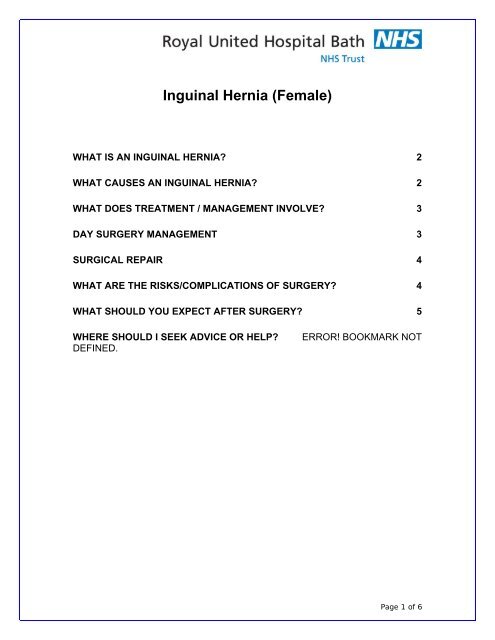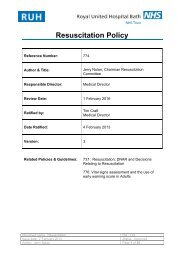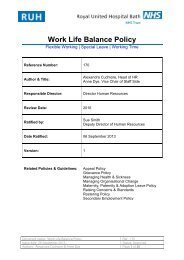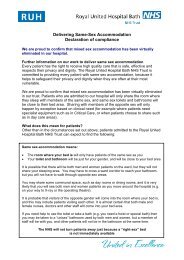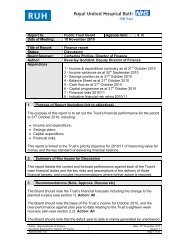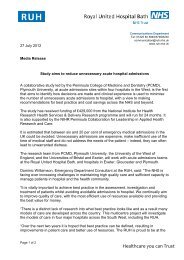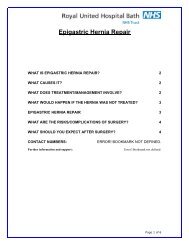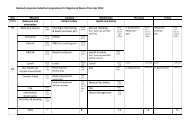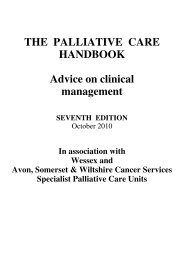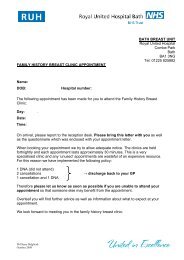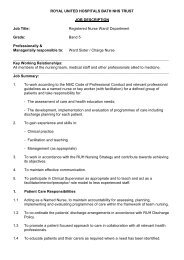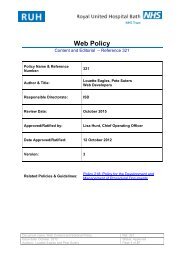Create successful ePaper yourself
Turn your PDF publications into a flip-book with our unique Google optimized e-Paper software.
<strong>Inguinal</strong> <strong>Hernia</strong> (<strong>Female</strong>)<br />
WHAT IS AN INGUINAL HERNIA? 2<br />
WHAT CAUSES AN INGUINAL HERNIA? 2<br />
WHAT DOES TREATMENT / MANAGEMENT INVOLVE? 3<br />
DAY SURGERY MANAGEMENT 3<br />
SURGICAL REPAIR 4<br />
WHAT ARE THE RISKS/COMPLICATIONS OF SURGERY? 4<br />
WHAT SHOULD YOU EXPECT AFTER SURGERY? 5<br />
WHERE SHOULD I SEEK ADVICE OR HELP?<br />
DEFINED.<br />
ERROR! BOOKMARK NOT<br />
Page 1 of 6
What is an <strong>Inguinal</strong> <strong>Hernia</strong>?<br />
A hernia is hole or weakness in the structure of the abdominal wall through which<br />
the contents of the abdomen can protrude. This results in a plum sized or larger<br />
swelling.<br />
Within the swelling is usually a sack which may contain some bowel (gut) or fatty<br />
tissue. In an inguinal hernia, the swelling protrudes downwards through the<br />
inguinal canal which is in the groin.<br />
The hernia may give rise to episodes of pain or discomfort in the groin region<br />
particularly when physically active or lifting heavy objects.<br />
What causes an inguinal hernia?<br />
The inguinal canal is a natural weak area where the round ligament of the uterus<br />
passes and attaches to the pubic bone.<br />
If the muscles around the canal stretch too much or tear than the contents of the<br />
abdomen (fat or bowel) may protrude through the canal creating an abnormal<br />
swelling.<br />
Any condition that increases pressure within the abdomen such as obesity,<br />
chronic cough as a result of smoking or chronic straining as a result of<br />
constipation may encourage the development of a hernia. Increased abdominal<br />
pressure during pregnancy may also be a contributing factor.<br />
The weakness may also occur as a result of straining to lift heavy objects or<br />
physical exercise.<br />
Page 2 of 6
What does treatment / management involve?<br />
The ideal treatment for an inguinal hernia is surgical repair. The hernia may get<br />
larger with time and there is a risk of incarceration or strangulation.<br />
If it cannot be pushed back into the abdomen and it is effectively stuck in the<br />
canal it is referred to as ‘incarcerated’ and a blockage of the bowel may occur;<br />
this leads to bowel obstruction, which causes vomiting and abdominal pain.<br />
If you experience any of these symptoms you should contact your doctor<br />
immediately as you may require an emergency operation.<br />
Day Surgery Management<br />
We will see you in the hernia clinic at the RUH to confirm the diagnosis.<br />
We will then fully assess you (general fitness for the operation) to decide whether<br />
the operation to repair the hernia can be done as a day case or whether you<br />
need to stay overnight.<br />
The hernia can be repaired under general anaesthetic (you asleep) or local<br />
anaesthetic (you awake but area numb). This decision depends on you, the size<br />
and type of hernia and the judgement of the surgeon and anaesthetist.<br />
If it is decided to treat this as a day case you should be discharged on the same<br />
day as you come into hospital and therefore you will need to have transport<br />
accessible and someone to look after you, usually for at least 24hours.<br />
Page 3 of 6
Surgical Repair<br />
The aim of the operation is to fix the hole through which the hernia has appeared.<br />
The incision is made near the site of the swelling in the groin region.<br />
The pouch (hernia sac) is first dealt with and the weakness in the abdominal<br />
wall is strengthened. This will be done with a strong but thin plastic mesh. The<br />
mesh will stay in place permanently strengthening the area.<br />
The wound will be closed with dissolving stitches and covered with a dressing,<br />
which is waterproof to spray.<br />
The wound will be sealed within 4 – 5 days after which time you may remove the<br />
dressing and have a bath or shower.<br />
What are the risks/complications of surgery?<br />
• Wound haematoma - bleeding under the skin can produce a firm swelling<br />
of a blood clot (haematoma). This may simply dissipate gradually or leak<br />
out through the wound. Rarely this may result in a further operation.<br />
• Wound infection - minor wound infections do not need any specific<br />
treatment. However, when using ‘mesh’ to repair the hernia antibiotics are<br />
often given during the operation, this is to minimise the risk of deep-seated<br />
infection.<br />
• Rarely fluid may collect around the mesh and require drainage.<br />
• Nerve damage - several nerves cross the operative field in hernia surgery.<br />
It is usually possible to preserve them but some minor nerve injury, rather<br />
like a bruise, is common and returns too normal in time.<br />
Some patients develop chronic pain after hernia surgery, probably due to<br />
the pressure from the mesh on the nerves (occurs in about 2% of hernia<br />
repairs).<br />
• Recurrence of the hernia - fortunately recurrence after hernia repair<br />
should be rare (1-5%).<br />
These risks and complications will be explained and discussed with you when<br />
you are seen in the hernia clinic.<br />
We will need to obtain your consent at which time you can ask questions about<br />
the operation.<br />
Page 4 of 6
What should you expect after surgery?<br />
Some swelling or bruising around the wound site is not unusual, there will be<br />
some discomfort and tenderness where the incision has been made.<br />
In the period following your operation you should seek medical advice if you<br />
notice any of any of the following problems:<br />
• Increased pain, redness, swelling or discharge of the wound<br />
• Persistent swelling at the operation site<br />
• Persistent bleeding<br />
• Difficulty in passing urine<br />
• High temperature<br />
• Nausea or vomiting<br />
It is important that you try to walk normally from the first opportunity and<br />
overcome the stoop, which comes naturally from having an operation in that<br />
region of your body.<br />
Simple pain killing drugs will help to relieve most of the discomfort.<br />
It is usually advisable not to put excessive strain on that area for about 3-4 weeks<br />
after the operation, although progressive strenuous exercise is encouraged. This<br />
means avoiding lifting heavy weights until the wound is properly healed.<br />
It is advised that you should not try to drive until you are able to perform all the<br />
emergency procedures easily. This takes at least a week.<br />
Some insurance companies vary in the guidelines so please check with them to<br />
make sure you are covered to drive.<br />
Usually if you can get out of the bath without any and/or requiring assistance you<br />
should be safe to drive.<br />
It is important to avoid constipation and straining when you go to the toilet to<br />
open your bowels. Take plenty of fibre in your diet and drink plenty of fluids.<br />
If you find you continue to have difficulty with your bowels on your return home<br />
from hospital seek advice from your GP.<br />
Page 5 of 6
You may resume sexual relations as soon as this feels comfortable.<br />
If you require a sick certificate for work please ask a member of staff before<br />
discharge.<br />
If your work does not involve heavy lifting or violent exercise, then return to work<br />
could be as soon as 2-3 weeks, if it does then it is safer to wait for a further 2-4<br />
weeks.<br />
If this advice is not heeded, the repair could break down and the hernia may<br />
recur.<br />
Please retain this information leaflet throughout your admission, making<br />
notes of specific questions you may wish to ask the Doctor and/or Nurses<br />
before discharge.<br />
Where should I seek advice or help?<br />
Before the operation:<br />
Day surgery Pre assessment: 01225 826434<br />
First 24 hours after surgery:<br />
Telephone the ward where you were treated via the Hospital switchboard:<br />
R.U.H: 01225 428331<br />
Advice about your wound:<br />
Practice nurse at GP surgery<br />
NHS Walk-In Centre<br />
Advice about pain killers:<br />
Visit your local Pharmacist.<br />
General health inquiries:<br />
Ring NHS Direct on 0845 4647 (24 hours).<br />
Web address: www.nhsdirect.nhs.uk<br />
Problems related to surgery:<br />
Make an appointment with your GP.<br />
Urgent or severe problems:<br />
Call your GP or go to the A & E Dept at the RUH (or your local A & E)<br />
Page 6 of 6


